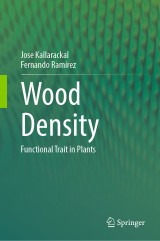Details
Wood Density
Functional Trait in Plants|
128,39 € |
|
| Verlag: | Springer |
| Format: | |
| Veröffentl.: | 22.06.2024 |
| ISBN/EAN: | 9783031610301 |
| Sprache: | englisch |
Dieses eBook enthält ein Wasserzeichen.
Beschreibungen
<p>Recent research has shed light on the crucial role of wood density, a fundamental physical property, as a <strong>functional trait</strong><strong>.</strong> This means wood density isn't just about how much a piece of wood weighs, but how it influences a plant's entire strategy for survival and growth. While variations exist between individual species, a surprising trend has emerged: the majority of this variation can be traced back to a plant's genus or even family. This strong <strong>phylogenetic signal</strong> indicates that wood density is a deeply ingrained characteristic, shaped by a plant's evolutionary history. This newfound understanding allows us to leverage wood density as a<strong> </strong><strong>taxon-based </strong><strong>functional trait</strong>. By considering the typical wood density of a plant group (like a genus or family), we can improve models and predictions related to various ecological and functional aspects in forests and plantations. Over the past couple of decades, scientists have been actively exploring the connections between wood density and a wide range of plant functions. Denser wood is often linked to slower growth rates, delayed reproduction, and increased mechanical strength. It also influences a plant's ability to transport water, resist death (mortality rate), and manage internal water balance (water potential). Additionally, wood density is closely tied to physiological aspects such as gas exchange and xylem hydraulic conductance, which are crucial for nutrient and water movement. Wood density is also an important parameter to determine the carbon sequestration capacity of a tree or vegetation, thus important in climate change research. This proposed book will delve into these fascinating connections, highlighting how wood density acts as a key player in shaping the lives of plants and the overall health of forest ecosystems.</p>
<p> </p>
<p> </p>
<p>1 Introduction.- 2 Wood and Wood Density.- 3 Functional Correlations of Wood Density.- 4 Wood Density Variations.- 5 Wood Density and Phytogeography.- <u>6</u> Wood Density and Biomass.- 7 Research needs and general conclusions.</p>
<p><b>Dr. Jose Kallarackal</b> – Presently a Consultant Scientist, received his doctorate from the University of Delhi and taught undergraduate courses in Botany in the same University for 6 years. He did his post-doctoral research at the University of New England, Armidale, Australia and University of Bayreuth, Germany. He was scientist and program coordinator at the Kerala Forest Research Institute, India for 21 years during which time he did several national and international projects on tree physiology and ecophysiology of tropical and temperate forests. He was a recipient of the Royal Society (London) Commonwealth Bursary, Australian Research Grants Associateship, Crawford Foundation Fellowship, International Timber Trade Organisation Fellowship (Japan), JICA (Japan) International Fellowship, and the Alexander von Humboldt Fellowship (Germany). Using the above fellowship, he has collaborated with several international groups working in the forest ecophysiology in Germany, Australia, New Zealand, China, etc. He has published two books related to impact of climate change on plants. Also, he is the author of several international publications in reputed journals. He has been a visiting scientist at the University of Bayreuth (Germany), University of Kassel (Germany), Landcare Research (NZ) and a speaker in several national and international conferences.</p>
<p><b>Fernando Ramirez Lopez</b> – Presently an Independent Researcher. He studied biology as an undergraduate and received his Master´s degree in Biological Sciences at Pontificia Universidad Javeriana, Bogotá, Colombia. He has been investigating the reproductive physiology of tropical crops such as mango, tree tomato, lulo, and uchuva. He has coauthored several books and research manuscripts in the field of tropical plant biology. </p>
<p><b>Fernando Ramirez Lopez</b> – Presently an Independent Researcher. He studied biology as an undergraduate and received his Master´s degree in Biological Sciences at Pontificia Universidad Javeriana, Bogotá, Colombia. He has been investigating the reproductive physiology of tropical crops such as mango, tree tomato, lulo, and uchuva. He has coauthored several books and research manuscripts in the field of tropical plant biology. </p>
<p>Recent research has shed light on the crucial role of wood density, a fundamental physical property, as a <strong>functional trait</strong><strong>.</strong> This means wood density isn't just about how much a piece of wood weighs, but how it influences a plant's entire strategy for survival and growth. While variations exist between individual species, a surprising trend has emerged: the majority of this variation can be traced back to a plant's genus or even family. This strong <strong>phylogenetic signal</strong> indicates that wood density is a deeply ingrained characteristic, shaped by a plant's evolutionary history. This newfound understanding allows us to leverage wood density as a<strong> </strong><strong>taxon-based </strong><strong>functional trait</strong>. By considering the typical wood density of a plant group (like a genus or family), we can improve models and predictions related to various ecological and functional aspects in forests and plantations. Over the past couple of decades, scientists have been actively exploring the connections between wood density and a wide range of plant functions. Denser wood is often linked to slower growth rates, delayed reproduction, and increased mechanical strength. It also influences a plant's ability to transport water, resist death (mortality rate), and manage internal water balance (water potential). Additionally, wood density is closely tied to physiological aspects such as gas exchange and xylem hydraulic conductance, which are crucial for nutrient and water movement. Wood density is also an important parameter to determine the carbon sequestration capacity of a tree or vegetation, thus important in climate change research. This proposed book will delve into these fascinating connections, highlighting how wood density acts as a key player in shaping the lives of plants and the overall health of forest ecosystems.</p>
<p> </p>
<p> </p>
Scientific and technical book shops Libraries As e-books
Diese Produkte könnten Sie auch interessieren:

Handbook of Poisonous and Injurious Plants

von: Lewis S. Nelson, L.R. Goldfrank, Andrew Weil, Richard D. Shih, Michael J. Balick

117,69 €
















